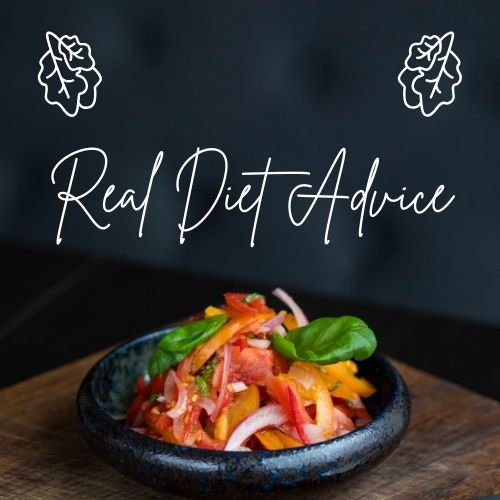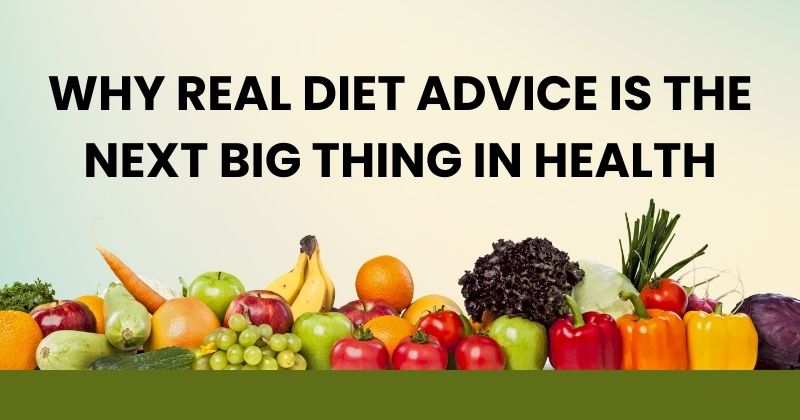Explore why experts are calling real diet advice the next big thing in the world of health and wellness.
In an era where health and wellness are increasingly prioritized, a new trend is emerging: real diet advice. It’s a refreshing departure from the countless fad diets and quick-fix solutions that have dominated the scene so far. But why is real diet advice becoming so popular? And more importantly, why is it the next big thing in health?
Real diet advice puts a holistic approach to nutrition at front. Instead of focusing on quick-fixes or temporary solutions, it recognizes the importance of understanding an individual’s body and health needs before making dietary recommendations. The focus is not just on what to eat but also how to eat in order to achieve optimal health – which means being aware of where food comes from, when to eat and how to combine different foods. By recognizing the importance of these elements, it supports a balanced diet that is tailored to an individual’s needs.
Real Diet Advice
Real diet advice is a holistic approach to nutrition that emphasizes healthy, balanced eating instead of restrictive diets. It’s not about following a specific diet plan or counting calories; it’s about understanding what your body needs and nourishing it properly.
The core principles of real diet advice include:
Eating a wide variety of foods: This includes fruits, vegetables, whole grains, lean proteins, and healthy fats.
Prioritizing real food: Opt for fresh, whole foods over processed, packaged ones.
Balancing macronutrients: Make sure your meals include a balance of proteins, carbohydrates, and fats.
Listening to your body: Eat when you’re hungry and stop when you’re full.

Table 1: Examples of Real Foods
| Food Group | Examples |
|---|---|
| Fruits | Apples, Bananas, Berries |
| Vegetables | Broccoli, Spinach, Carrots |
| Proteins | Chicken, Fish, Legumes |
| Grains | Brown Rice, Oats, Whole Wheat Bread |
| Fats | Avocados, Olive Oil, Nuts |
- Fruits: Rich in vitamins, minerals, and fiber, fruits like apples, bananas, and berries are essential for your overall well-being. They’re nature’s candy—sweet, delicious, and good for you!
- Vegetables: These are your go-to sources for essential nutrients like vitamins A and C, potassium, fiber, and antioxidants. Foods like broccoli, spinach, and carrots are not just colorful additions to your plate; they’re life-enhancing medicines.
- Proteins: Whether you’re a meat-eater or a vegetarian, proteins are the building blocks of life. Chicken, fish, and legumes provide the essential amino acids your body needs to repair cells and build new ones.
- Grains: Whole grains like brown rice, oats, and whole wheat bread are excellent sources of energy. They provide essential nutrients and are rich in dietary fiber, which helps in digestion and maintaining a healthy weight.
- Fats: Don’t shy away from fats; just choose the healthy ones. Avocados, olive oil, and nuts provide essential fatty acids and are good for your heart, brain, and skin.
Why is Real Diet Advice the Next Big Thing in Health?
There are several reasons why real diet advice is rapidly gaining popularity in the health sector.
Evidence-Based Nutrition
Real diet advice is grounded in evidence-based nutrition. It relies on scientific research and proven nutritional principles rather than anecdotal evidence or personal testimonials. This makes it a reliable and trustworthy source of dietary advice.
Personalized Nutrition Plans
Real diet advice is tailored to an individual’s needs. It takes into account the person’s health history, lifestyle, and goals in order to create a nutrition plan that works for them. There’s no one-size-fits-all approach with real diet advice; it recognizes that everyone is different and must be treated accordingly.
Achievable Weight Loss
Unlike fad diets that promise rapid weight loss only to leave you feeling deprived and hungry, real diet advice promotes sustainable weight loss. By teaching you to make healthier food choices and listen to your body’s hunger signals, it sets you up for long-term success.
Improved Overall Health
Real diet advice doesn’t just focus on weight loss – it aims to improve overall health. A balanced diet can reduce the risk of chronic diseases like heart disease, diabetes, and cancer. It can also boost energy levels, improve mood, enhance sleep quality, and promote better digestive health.
Personalized Approach
Real diet advice recognizes that everyone is different. What works for one person may not work for another. Hence, it encourages a personalized approach to nutrition, taking into account factors like age, gender, lifestyle, and individual health goals.
Real Diet Advice in Practice
So, how can you incorporate real diet advice into your daily life? Here are some practical tips:
Start your day with a balanced breakfast: Include a source of protein (like eggs or yogurt), a serving of whole grains (like oatmeal or whole-grain bread), and a portion of fruits or vegetables.
Snack smart: Choose snacks that combine protein and fiber for sustained energy. Nuts and seeds, hummus with veggies, or Greek yogurt with berries are all great options.
Plan your meals: Planning your meals ahead of time can help you ensure you’re getting a balanced diet and can also reduce the temptation to reach for unhealthy, convenience foods.
Stay hydrated: Don’t forget to drink plenty of water throughout the day.
The Mayo Clinic and Real Diet Advice
The Mayo Clinic, a renowned healthcare organization, has long been a proponent of real diet advice. Their diet program emphasizes healthy eating and regular physical activity, and it provides practical and realistic ideas for incorporating these principles into your daily life.
The Mayo Clinic also encourages people to focus on the quality of their food choices, not simply the quantity. That means choosing mostly plant-based foods that are low in processed and added sugars, sodium, unhealthy fats, and refined grains. Doing so can help you reduce your risk for chronic health conditions like high blood pressure, high cholesterol, heart disease, type 2 diabetes, and certain types of cancer.
Additionally, the Mayo Clinic promotes healthy eating habits such as reading food labels to understand what’s in your food, being mindful when eating to avoid overeating or skipping meals, and focusing on portion sizes.
Key Takeaways
Real diet advice is an evidence-based approach to nutrition that emphasizes a balanced diet and a personalized approach to eating.
It promotes sustainable weight loss and improved overall health.
Practical ways to incorporate real diet advice into your life include eating a balanced breakfast, snacking smart, planning your meals, and staying hydrated.
Organizations like the Mayo Clinic endorse real diet advice and provide practical resources to help individuals implement it.
Final Thoughts
In conclusion, real diet advice is indeed the next big thing in health. It offers a refreshing and sustainable approach to nutrition – one that promotes not just weight loss, but overall health and well-being. So why not ditch the fad diets and start embracing real diet advice today? Your body will thank you for it.
Make exercise a priority: Regular physical activity is another key component of a healthy lifestyle. Aim to incorporate at least 30 minutes of moderate-intensity aerobic activity into your daily routine. Consider activities like walking, running, swimming, or cycling. If possible, break up your workout into smaller chunks throughout the day – 10 minutes here and there can still make an impact!
Recommended Post For You
- Real Diet Advice: Transformative Tips Beyond the Hype
- The Real Deal: Unveiling the Benefits of Real Diet Advice
- Real Diet Advice: Your Key to a Healthier Lifestyle
- Top 3 Misconceptions About Real Diet Advice – Debunked!
- Debunking Myths: The Real Facts About Real Diet Advice
- Is Real Diet Advice a Game-Changer? Truth Revealed!
- Boost Your Health with These 7 Real Diet Advice Tips
- Master Your Meals: Real Diet Advice for Meal Planning
- Why ‘Real Diet Advice’ Isn’t As Scary As You Think!
- Stop Guessing: Get the Real Diet Advice You Deserve
References
- Mayo Clinic. (n.d.). Healthy Lifestyle: Nutrition and healthy eating. Retrieved from https://www.mayoclinic.org/healthy-lifestyle/nutrition-and-healthy-eating/basics/healthy-diets/hlv-20049477.
- American Heart Association. (n.d.). Eating a Balanced Diet. Retrieved from https://www.heart.org/en/healthy-living/healthy-eating/eat-smart/nutrition-basics/food-as-fuel-before-during-and-after-workouts.
- Centers for Disease Control and Prevention. (n.d.). Physical Activity Basics. Retrieved from https://www.cdc.gov/physicalactivity/basics/index.htm.
- Harvard Health. (n.d.). Break up your workout. Retrieved from https://www.health.harvard.edu/staying-healthy/break-up-your-workout.
